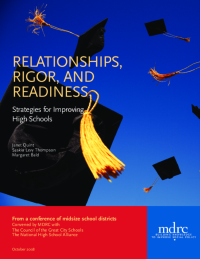Relationships, Rigor, and Readiness
Strategies for Improving High Schools
In the 21st-century economy, nothing is more important than preparing our young people to achieve success in postsecondary education and in a labor market that increasingly rewards skills and knowledge. Our nation’s public high schools are where most young people go to receive that crucial preparation. Yet, in many communities, particularly in our cities, upwards of half of all high school students drop out, and too many of those who finish high school are not ready for higher education, training, or the workplace.
This report offers lessons from the last in a series of three high school reform conferences sponsored by MDRC, the Council of the Great City Schools, and the National High School Alliance, with generous support from the Bill & Melinda Gates Foundation and the James Irvine Foundation. This conference, which brought together leaders from 22 midsize urban school districts on June 25-26, 2007, provided a forum for practitioners to share research- and practice-based lessons about helping students transition successfully into high school, stay on track to graduation, and be prepared for moving into postsecondary education, training, or the workforce. District leaders also heard from some of the nation’s top education researchers and leaders, including Ronald Ferguson of Harvard’s John F. Kennedy School of Government; Chancellor Joel Klein of the New York City Department of Education; Pedro Noguera of New York University’s Steinhardt School of Culture, Education, and Human Development; and Bob Wise of the Alliance for Excellent Education.
As this report’s title suggests, the conference generated a lot of provocative discussion about the importance of building strong relationships among teachers and students, offering rigorous and relevant academics, and focusing on making students ready for their next step, whether postsecondary education or the world of work. And while the district leaders affirmed their commitment to learning from the best that strong research has to offer, many of the strategies urban districts are employing are based on the insight and experience of educators and have not been rigorously tested. A challenge for both practitioners and researchers is to build a shared learning community in which researchers are responsive to the needs of district and school leaders and practitioners are committed to taking lessons from research and to building knowledge as they innovate. The report concludes with some ideas for creating such a shared knowledge-building agenda.
Finally, we express our thanks to the more than 60 leaders from the 22 districts for sharing their wisdom and experience, as well as to our co-conveners and our funders for their support.






